Day rate contracting in the Salesforce ecosystem. What do I need to consider?
The Salesforce market has been known to have a high and consistent demand for day rate contractors.
However making the transition from permanent employment to day rate contracting can be a significant change, and it's natural to have questions and concerns.
We have accumulated your frequently asked questions that have come up over the years during that process.
What is the difference between permanent employment and day rate contracting?
Permanent employment refers to a long-term employment relationship in which an employee works for a company on a full-time basis with no specific end date. The person is paid an annual base salary plus superannuation. Day rate contracting, on the other hand, involves working for a company on a short-term basis, typically for a specific project or period of time. In the Salesforce ecosystem, you would usually come across 6 month – 12 month contract with a likelihood of further extension. Day rate contractors are typically self-employed and are paid by the day for their work on a weekly, fortnightly, or monthly basis.
What are the benefits of contracting?
One great advantage is the opportunity to earn a higher income. Day rates contracts in the Salesforce ecosystem pay up to 30% and more, compared to permanent salaries. This is due to the fact that contractors are compensated for the lack of paid annual leave, sick leave, overall job security, and often have a niche and in demand skill set.
Another great advantage is the ability to work on different projects in a short amount of time and see a variety of Salesforce use cases in different environments. This means you will gain a range of experience, which in turn can increase your market value yet again.
What are the risks of contracting?
One potential drawback is a lack of job security and employee benefits. Day rate contractors come at a higher cost to organisations, which usually means they are one of the first group of people exposed to redundancies.
If you are contracting through your own Pty Ltd and have your own ABN, you will also need to handle your own taxes and insurances.
What is a PAYG contractor?
A PAYG (Pay-As-You-Go) contractor your tax and superannuation obligations are usually managed by an external party, such as a recruitment agency, payroll company or contractor management company. Starting as a PAYG contractor is the most common and easiest way to transition from permanent employment to day rate contracting. You should be able to switch from PAYG to Pty Ltd any time.
What is a Pty Ltd (ABN) contractor?
Being a Pty Ltd contractor means contracting through a private company (Pty Ltd) and you having a registered ABN. It also means you are responsible for your own taxes, superannuation payments and insurances.
How do I handle taxes and insurance as a day rate contractor?
As a day rate contractor, you'll be responsible for handling your own taxes and insurances, for example PI (professional indemnity) and PL (public liability). This means that you'll need to set aside a portion of your earnings to pay for these expenses, as you won't have an employer handling them for you. It's a good idea to consult with a financial advisor or accountant to make sure you're setting aside enough money and that you're properly handling your taxes.
Can I switch from PAYG to Pty Ltd at a later stage?
Yes, it is possible to switch from being a PAYG contractor to a contractor operating through a private company (Pty Ltd). This can be a good option if you want to operate your business as a separate legal entity and potentially access certain tax benefits.
However, it's important to keep in mind that operating as a Pty Ltd company involves some additional responsibilities and obligations. For example, you will need to register your company with ASIC, maintain proper record-keeping and financial reporting, have the right insurances, and comply with various business laws and regulations.
Is my daily rate including super, excluding super or plus GST?
Unless otherwise specified, the hiring manager, talent acquisition partner and recruiter will assume your daily rate is quoted including superannuation if you are a PAYG contract or plus GST if you are a Pty Ltd contractor.
Making the transition from permanent employment to day rate contracting can be a big change, but it can also be a rewarding one. By doing your research, networking, and carefully considering your day rate, you can set yourself up for success as a contractor
If you'd like additional information, we have written another article on “Pros and Cons of PAYG vs. Pty Ltd”

